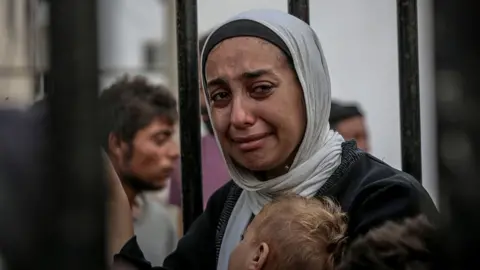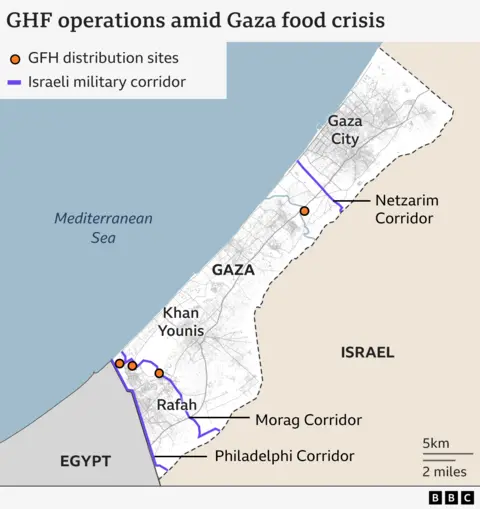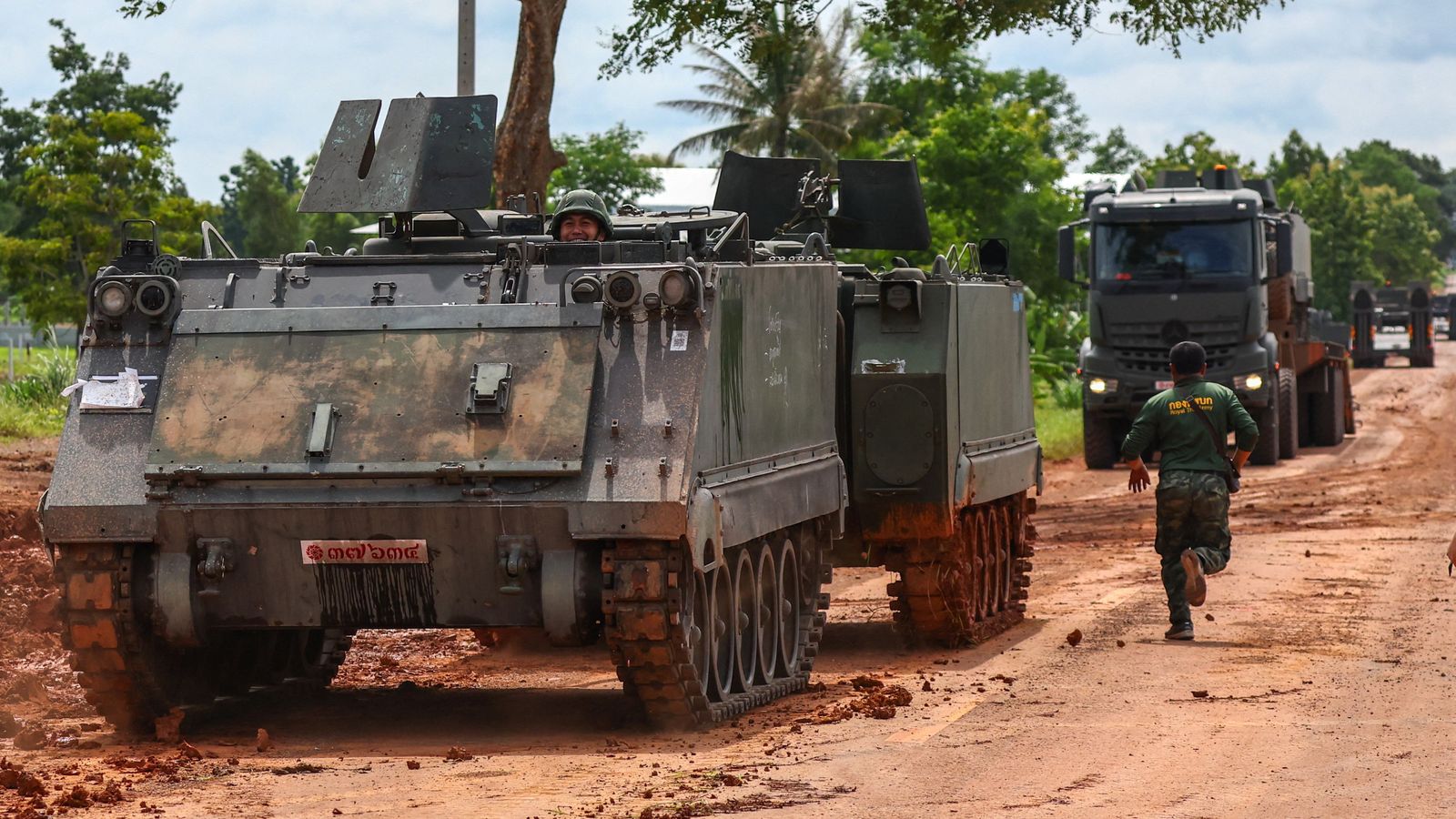BBC News, Jerusalem
BBC News, Sydney
 Getty Images
Getty ImagesMore than 50 Palestinians were killed and 400 others injured while waiting for food near a crossing in northern Gaza on Wednesday, a hospital says, as US special envoy Steve Witkoff visited Israel.
Footage showed casualties from the incident near the Zikim crossing being taken on carts to al-Shifa hospital in Gaza City.
Gaza’s Hamas-run Civil Defence agency said Israeli forces fired at the crowds gathered around aid lorries. The Israeli military said troops fired “warning shots” but that it was “not aware of any casualties”.
Witkoff met officials in Israel as he tried to salvage stalling ceasefire efforts and alleviate the humanitarian crisis in Gaza.
Israeli officials have threatened that if there is no progress in the coming days on a ceasefire and hostage release deal, then they may take new punitive steps against Hamas. Israeli media reported that those could include annexing parts of Gaza.
It also reported that Witkoff would also visit aid distribution sites run by the controversial Israeli- and US-backed Gaza Humanitarian Foundation (GHF).
Shortly after his envoy’s arrival in Israel, US President Donald Trump wrote on social media: “The fastest way to end the Humanitarian Crises in Gaza is for Hamas to SURRENDER AND RELEASE THE HOSTAGES!!!”
Gaza’s Hamas-run health ministry reported another seven malnutrition-related deaths on Wednesday, bringing the total to since the start of the war to 154.
It came a day after the UN-backed global food security experts warned that the “worst-case scenario of famine” was “currently playing out” among the 2.1 million population.
UN agencies have also said there is man-made, mass starvation in Gaza and blamed Israel, which controls the entry of all supplies to Gaza. But Israel has insisted that there are no restrictions on aid deliveries and that there is “no starvation”.
Despite that, four days ago it implemented measures that it has said are aimed at helping the UN and its partners collect aid from crossings and distribute it within Gaza, including daily “tactical pauses” in military operations in three areas and the creation of what it calls “designated humanitarian corridors”.
The UN’s humanitarian office has said the tactical pauses do not allow for the continuous flow of supplies required to meet the immense needs of the population, and that desperately hungry crowds continue to offload supplies from lorries as they pass through Israeli crossings.
The director of al-Shifa hospital, Mohammed Abu Salmiya, told the BBC on Thursday morning that it had received the bodies of 54 people who were killed in the incident in the Zikim area, as well as 412 people who were injured.
On Wednesday night, the Hamas-run Civil Defence agency told AFP news agency that at least 30 people were killed when Israeli forces opened fire on a crowd waiting for aid there.
The Palestinian Red Crescent, meanwhile, reported that its al-Saraya field hospital and al-Quds hospital in Gaza City had received a total of six dead and 274 injured from the same incident.
The Israel Defense Forces (IDF) said in a statement that “dozens of Gazans was identified gathering around aid trucks in northern Gaza, and in close proximity to IDF troops operating in the area”.
“The troops fired warning shots in the area, not directed at the gathering, in response to the threat posed to them,” it added.
“According to an initial inquiry, the IDF is not aware of any casualties as a result of IDF fire. The details of the incident are still being examined.”
International journalists are blocked by Israel from entering Gaza independently, so it is difficult to verify what happened.
However, one man interviewed by a local freelance journalist working for the BBC said he knew a teenage boy who was killed.
“In the current situation, there is no food or water. People go to get food from the Zikim area, where they are targeted. He went to bring flour but came back carried in the flour bag,” he said.
“What was his fault? They sniped him in the middle of his head. He wasn’t carrying a rock, or a weapon, or doing anything wrong. His only fault was being Palestinian and living in Gaza.”
Abu Taha al-Kafarneh, a unemployed father of two who was the main breadwinner for his family, was also among the dead, another man told the BBC.
“He went to get a bag of flour to secure his food for the day… He didn’t want to trade it, sell it, or profit from it like many of the looting merchants,” he said.
He added: “They [Israel] claim they let food in, but instead increase the number of those killed and martyred as much as they can. The morgue is full.”
On Wednesday morning, hospital sources in southern Gaza told the BBC that six people were killed near an aid distribution centre run by the GHF in the Rafah area.
The IDF told the BBC a “gathering of suspects” it said posed a threat to its troops were told to move away, and subsequently the army fired “warning shots” at a distance of “hundreds of metres away” from the site.
The military also said that “an initial review suggests that the number of casualties reported does not align with the information held by the IDF”.
The GHF said no killings took place at or near its sites on Wednesday.

According to the UN human rights office, more than 1,050 Palestinians have been killed by the Israeli military while trying to get food aid since the GHF began operating in late May.
It said last week that at least 766 of them had been killed in the vicinity of one of the GHF’s four distribution centres, which are operated by US private security contractors and are located inside Israeli military zones.
Another 288 people had been killed near UN and other aid convoys, it added.
Israel has accused Hamas of instigating the chaos near the aid sites. It says its troops have only fired warning shots and that they do not intentionally shoot civilians.
The GHF has said the UN is using “false” figures from Gaza’s health ministry.
The organisation has said it has handed out more than 98 million meals over the past two months and that it stands ready to work with the UN to deliver aid.
However, the UN has refused to co-operate with the GHF’s system, saying it is unsafe and violates the humanitarian principles of neutrality, impartiality and independence.
The Israeli military launched a campaign in Gaza in response to the Hamas-led attack on southern Israel on 7 October 2023, in which about 1,200 people were killed and 251 others were taken hostage.
At least 60,249 people have been killed in Gaza since then, including 111 over the past day, according to the territory’s health ministry.



Leave a Comment